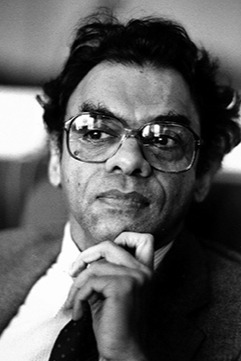A. K. Ramanujan
Biography
Attipat Krishnaswami Ramanujan (A. K. Ramanujan) was one of India’s most distinguished poets, translators, folklorists, and scholars. Writing both in English and Kannada, he played a key role in introducing Indian literature, culture, and folklore to the world. His works are known for their lyrical beauty, cultural insight, and deep human sensitivity.
🌿 Early Life and Education
A. K. Ramanujan was born on March 16, 1929, in Mysore, Karnataka, into a Tamil-speaking Brahmin family. His father was a mathematician, while his mother was deeply religious—an influence that shaped his lifelong fascination with the tension between tradition and modernity.
He studied at the University of Mysore and later at Deccan College, Pune, earning degrees in English literature and linguistics. In 1959, he moved to the United States on a Fulbright fellowship, where he later taught at the University of Chicago, becoming an influential scholar and teacher.
✍️ Literary Career
Ramanujan’s poetry, written in English, explores themes of identity, memory, family, cultural conflict, and belonging. His poems often reflect his experience of living between two worlds — India and the West.
Major Poetry Collections:
The Striders (1966)
Relations (1971)
Second Sight (1986)
Collected Poems (1995)
His poetry is known for its simplicity, precision, and emotional depth. Poems like A River, Obituary, and Small-Scale Reflections on a Great House are among his most celebrated works.
🌺 As a Translator and Scholar
A. K. Ramanujan was also an exceptional translator who brought classical Indian poetry and folklore to global audiences. His translations combined scholarship with poetic sensitivity.
Notable Translations:
Speaking of Śiva (1973) — translations of 12th-century Kannada bhakti poems
The Interior Landscape: Love Poems from a Classical Tamil Anthology (1967)
Poems of Love and War: From the Eight Anthologies and the Ten Long Poems of Classical Tamil (1985)
Folktales from India (1991)
His essays, such as “Is There an Indian Way of Thinking?”, remain widely studied for their insightful reflections on Indian culture and identity.
🧭 Themes and Style
Ramanujan’s work balances tradition and modernity, India and the West, and memory and experience. He used vivid imagery, irony, and personal reflection to explore human emotions and cultural contradictions.
His translations and essays also emphasized the plurality of Indian traditions, showing how multiple voices coexist within Indian culture.
🏅 Awards and Recognition
Sahitya Akademi Award (posthumously, 1999)
Padma Shri (1976)
Several international honors for literature and translation
🕊️ Legacy
A. K. Ramanujan passed away on July 13, 1993, but his legacy endures through his poetry, translations, and essays. He remains a pioneer in Indian English poetry and a cultural interpreter who helped the world appreciate the depth of Indian literature.
Ramanujan is remembered as a poet of bridges — connecting languages, traditions, and worlds, while staying true to the nuances of both the personal and the cultural.
